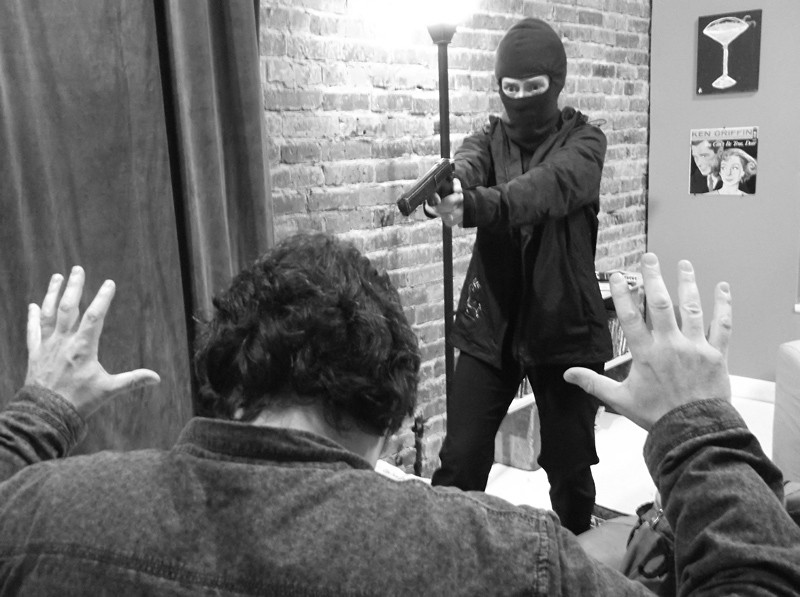From flying saucers in Roswell, New Mexico to Glenn Beck’s chalkboard, conspiracy theories offer an illusion of mastery over the chaotic, the frightening, and the unknown. Believing that because the streets are deserted, your neighbors must have been abducted by aliens can feel more compelling than the more banal and plausible explanation that everyone’s home playing on their computers.
Hot off a memorable Seattle Public Theater performance as a phlegmatic shop owner in Tracy Letts’ dramedy Superior Donuts, Kevin McKeon wrote and stars in this new one-act comic thriller. He plays the likewise phlegmatic Roy (career not mentioned), who comes home to find estranged ex-stepdaughter Lacey (Meg McLynn) in black-op duds, armed with a gun. McLynn is utterly convincing as a paranoid, hyper, ex-druggie drama queen, all sunken eye sockets and siren’s distress signals. While she is all freak-out all the time, the script gives Roy a broader palette of moods, from skeptical to placating to conciliatory. (However, the affable, ponytailed McKeon relies mostly on his vertical brow furrows to convey emotions.) Her friend, Lacey tearfully relates, has disappeared after an Exorcist-like bout of indigestion, and it’s looking like an alien plot. Some details of story and behavior don’t quite jibe: There’s supposedly a contagion issue, yet Roy doesn’t seem viscerally fearful of infection. Still, as in most sci-fi, getting hung up on details imperils your good time, so try not to.
Happily for us, into the narrative gridlock shambles Blaine (Robert Kriley), Roy’s neighbor. Blessed with a straight flush of comic endowments (including pendulous eye bags and tufty, upswept eyebrows), Kriley’s Blaine amusingly contributes his encyclopedic knowledge of sci-fi movies to the search for truth. His Hollywood-fueled theories can be hackneyed (citing the loss of individuality, the burden of freedom, “maybe we secretly want to be brain-dead,” etc.), but other observations ring topical. Ritalin he calls “frontal lobotomy in a tablet,” and he makes the valid point that we’ve developed collective cultural PTSD from a variety of modern traumas. From the Holocaust to al-Qaida, trusting folk have repeatedly been caught unaware. With that insight, the exhausted trio settles in to watch a video . . . and finally learns the truth about what’s going on.








